

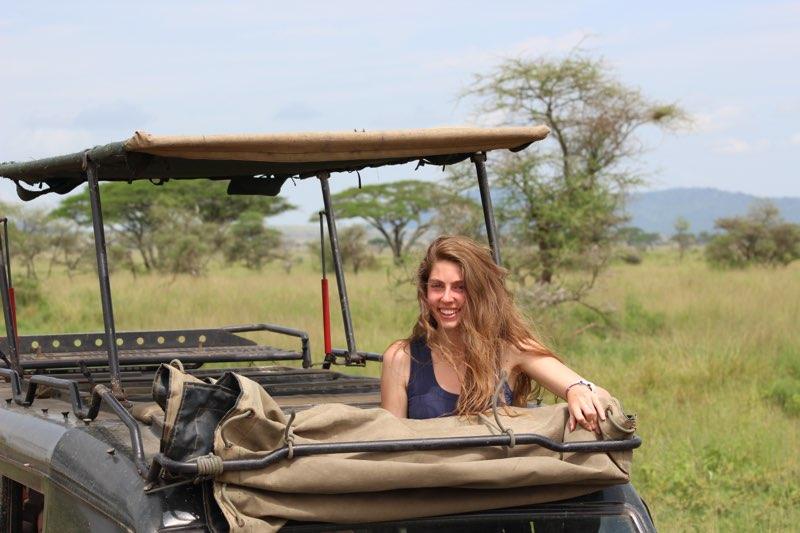
Found in translation
Photos courtesy of Makenzie Dowlin June 11, 2025
Blue Hen Makenzie Dowlin receives Critical Language Scholarship to study Swahili in Tanzania
When Makenzie Dowlin noticed the lion sniffing at the tire of her parked, open-roof truck, she stood on the passenger seat to get a better view of the beast.
“I didn’t feel scared,” said the University of Delaware alumna, adding: “Maybe I should have been.”
Dowlin probably should have felt a lot of things during her month-long safari in Tanzania last winter: grossed out by the hole in the ground that served as her makeshift toilet, inconvenienced by a leaky tent, frustrated by a serious language barrier. But for the intrepid Blue Hen from Coatesville, Pennsylvania, this study-abroad experience felt nothing short of mrembo (Swahili for “beautiful”).
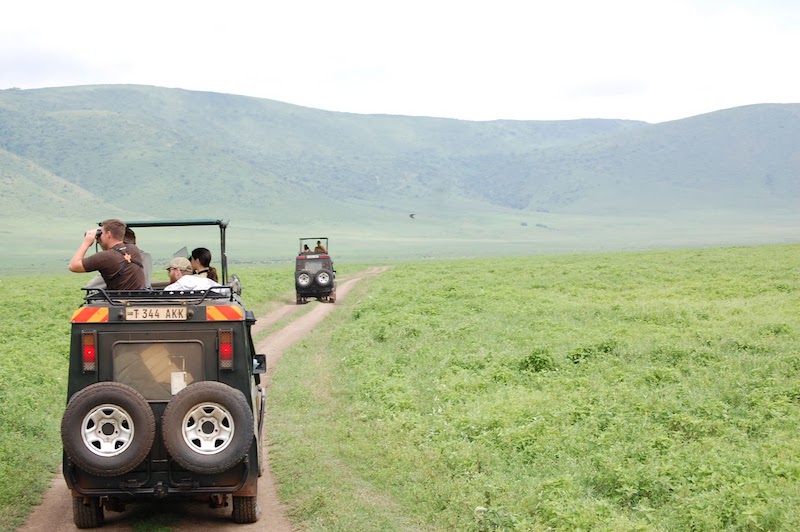
“It changed my life,” she said. “And I can’t wait to go back.”
Now, Dowlin is set to do exactly that — this time sponsored by a prestigious Critical Language Scholarship from the U.S. Department of State. The ultra-competitive program supports the study of languages critical to U.S. national security and global engagement. For eight weeks beginning mid June, she will immerse herself in Swahili, a dialect central to the cultural heritage across East and Central Africa.
“The goal is to become a citizen diplomat,” said Dowlin, who graduated in May. “To get a real understanding not just of the words and grammar, but of the people and what matters to them — and to bring that knowledge back to the U.S. It’s about advancing a global community.”
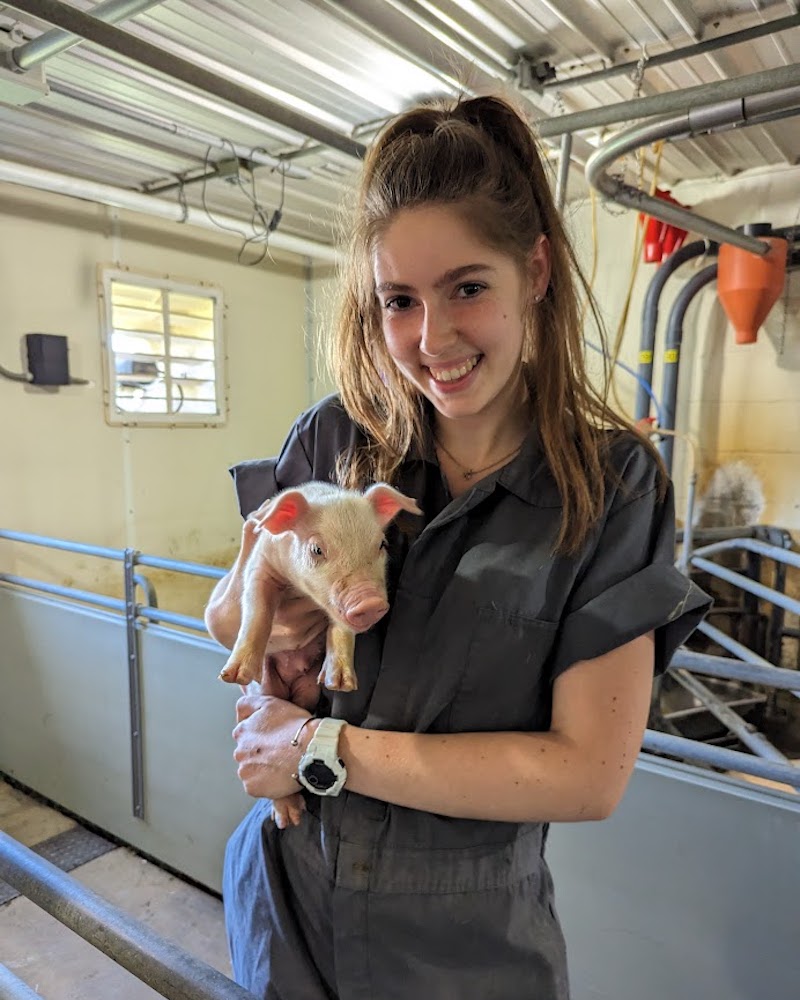
This is not the first time Dowlin has plunged headfirst into experiential learning. During her tenure as a pre-veterinary medicine major, she took advantage of internship opportunities with a nearby teaching dairy owned by the University of Pennsylvania, and she volunteered with the UPenn Swine Group, which addresses challenges facing the pork industry. (Ask her about artificially inseminating a pig). Dowlin also acquired a One Health certificate from UD, one of few universities in the world to offer the credential. It helped open her eyes, she said, to the “importance of considering human, animal and environmental health as interconnected.”
So when the opportunity arose to study wildlife and community conservation under Professor Jake Bowman in Tanzania, Dowlin packed her bags and flew to the bush. For four weeks, she explored breathtaking ecosystems, from the Serengeti to so-called cloud forests (“like tropical rainforests but cold.”) She fell in love with the feathery leaves of the acacia tree, and she geeked out over beetles as big as her hand — a thrill for an insect and wildlife ecology minor. At one point, she submerged herself in the freezing pool beneath a Tanzanian waterfall because, simply, “it was my one chance.” Most days, she and her fellow students took game drives through staggering vistas — the Ngorongoro Crater, a wild amphitheater formed by the collapse of a volcano, teemed with giraffes, zebras, wildebeests, black rhinos and, of course, stalking lions.
During the course of the trip, mostly a rugged camping excursion, three Tanzanians from different Aboriginal groups served as guides. While helping the Blue Hens navigate from wetlands to highlands, they imparted some basic Swahili: Mambo for “What’s up?,” jambo for “hello,” and mrembo for “beautiful.” Across ecosystems, they became more than just field experts — they became friends.
“I love them all so much,” Dowlin said. “They are very special to me, and learning from them was incredible.”
Specifically, the local guides shared their perspectives on animal conservation, views shaped in communities that revere and understand African wildlife on a deep level — even as 2,000 pound pachyderms level their homes and destroy their crops. Even as lions kill Tanzanians on a yearly basis.
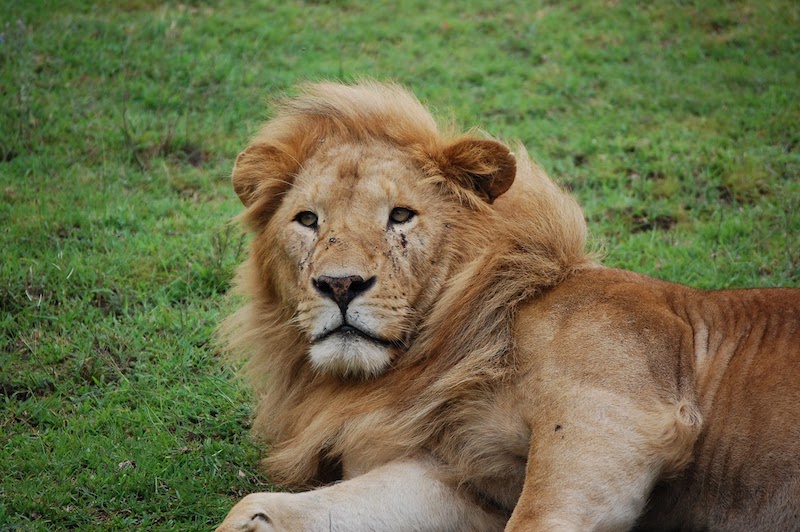
For Dowlin, who would like to pursue a career as a conservation veterinarian working to protect and manage wild animal populations, this dialogue drove home the importance of considering local communities when shaping conservation strategy. For example: How do you expand protected sanctuaries without displacing families? Should you limit trophy hunting — or work to ensure money from trophy-hunting tourism is directed back into community-based conservation efforts?
To find answers, Dowlin recognizes that she’ll need to immerse herself within communities far removed from her own. That begins this summer, when she’ll live with a Tanzanian family and attend the MS Training Centre for Development Cooperation, a state-of-the-art facility that empowers citizens with education aimed at social transformation.
On the slopes of Mount Meru — a dormant volcano considered the “abode of gods” in Hindu and Buddhist traditions — Dowlin will receive a year’s worth of foreign language training compressed into two months. It’s a chance afforded to very few. The acceptance rate for a Critical Language Scholarship is less than 10% — and Dowlin doesn’t intend to waste it.
“This is a once-in-a-lifetime opportunity I just can’t pass up,” she said. “And the UD community has been so supportive. The faculty here have given me confidence to pursue things I never thought possible.”
As for her post-summer plans, Dowlin hopes to attend veterinary school before finding the conservation job that may or may not take her abroad. And if life eventually leads her back to Africa, living full-time in the land of wild craters and cloud forests? That, she said, will be nothing short of mrembo.
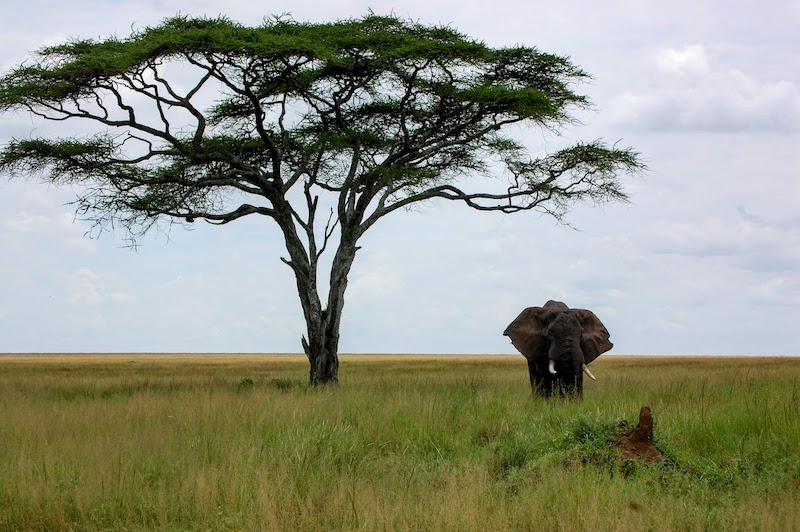
Contact Us
Have a UDaily story idea?
Contact us at ocm@udel.edu
Members of the press
Contact us at mediarelations@udel.edu or visit the Media Relations website

